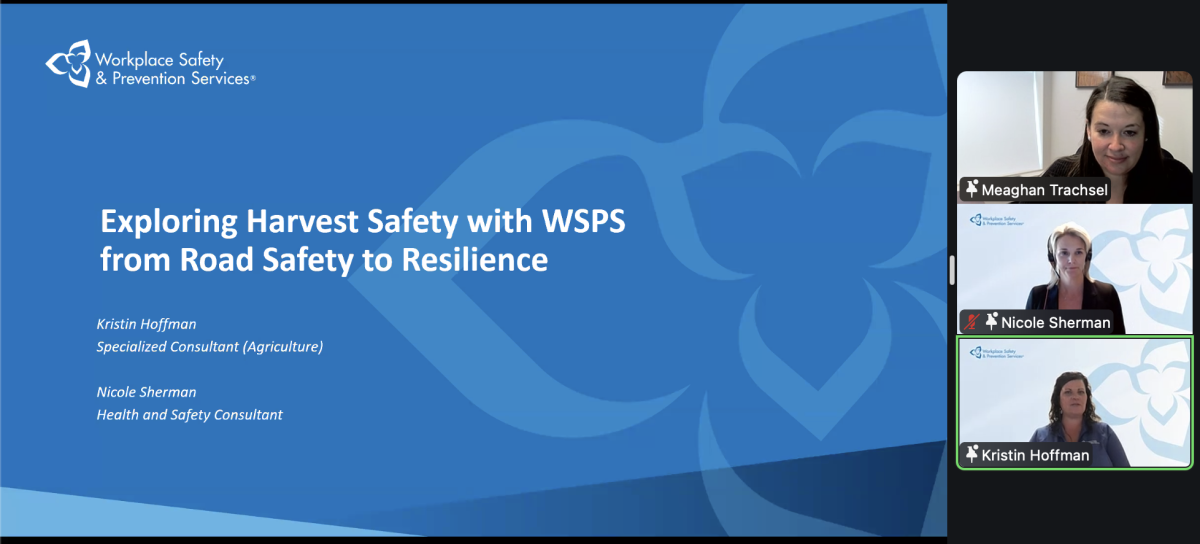An agreement has been signed between federal and provincial ag ministers on the goals of the follow-up to the Growing Forward ag policy funding framework — but with one major holdout.
Ontario’s ag minister Carol Mitchell did not sign onto the ministers’ joint statement Friday on what’s been dubbed “Growing Forward 2,” citing a lack of federal support for the province’s new risk management program (RMP).
In her own statement Friday, Mitchell also warned of a federal proposal to dial back funding for the AgriStability farm income stabilization program.
Read Also

Exploring Harvest Safety
Kristin Hoffman of WSPS explains measures for increased farm safety around harvest season
“Ontario farmers want the federal government to support Ontario’s risk management program and the federal government said no,” she said in a statement following the ministers’ meetings held Wednesday to Friday at St. Andrews-by-the-Sea, N.B.
“I did not sign on to this flawed agreement on future programs because Ontario farmers told me it would take us in the wrong direction and not provide our family farms what they need to continue to bring quality, locally-grown food to Ontario tables.”
Furthermore, she said, “in a time when many farms and farm businesses are just starting to recover from losses, we cannot cut support to programs like AgriStability, as is being proposed by the federal government.”
Ontario, which recently released details on the levels of support available under its RMP, has said the RMP is meant as a companion to production insurance and AgriStability, with the province funding RMP at the full amount of its usual 40 per cent share.
The province treats RMP payments an advance on the province’s 40 per cent share of a producer’s AgriStability payment, in which an eligible producer would keep the greater of the two payments.
The ministers’ statement Friday did not mention any proposed decrease in funding for AgriStability, but did note their agreement was reached “with the exception of Ontario.”
“Broad outcomes”
What the ministers called the “St. Andrews Statement” or SAS is meant to provide instructions to federal and provincial ag bureaucrats in negotiating and developing Growing Forward 2 (GF2), which is expected to be put in place for April 1, 2013.
The SAS laid out “two broad outcomes” for GF2 for the ag industry, including farmers, processors and supporting businesses: “competitiveness in domestic and international markets” and “adaptability and sustainability for the sector.”
The statement also notes “innovation” and “institutional and physical infrastructure” as the two “key drivers” needed to achieve those outcomes.
There’s a need, the SAS said, to “continuously adapt policies and practices and to attract new capital and new participants to the sector to meet the challenge of aging population and the need for renewal this creates.”
Looking specifically at GF2 programming, the SAS calls for programs to be “streamlined to achieve efficient delivery with the minimum administrative burden possible for participants” and to “incorporate performance and evaluation measures” into the programs.
Participating governments, the SAS said, “would establish mechanisms for managing costs to sustain program affordability for all governments over the duration of the framework while respecting the 60:40 federal/provincial cost-share ratio.”
While not mentioning Ontario’s RMP, the SAS said the participants would consider “developing innovative FPT (federal/provincial/territorial) funding and program arrangements to allow for provincial flexibility (and) address priority needs while at the same time ensuring FPT coherence.”
Meat trade pilots
The ministers on Friday said they also reviewed the results of pilot projects launched in February to expand interprovincial trade in meat and “agreed to move quickly and to strengthen efforts to advance these pilots.”
Among other issues at the St. Andrews meeting, the ministers said they also reviewed the “evolving flooding situation which farmers are facing across Canada, and pledged to continue working together to assess what further assistance is required.”
They also “acknowledged the progress being made on a national livestock traceability system due to the shared efforts of industry and governments to move it forward.”
On the same day that the ag ministers from Saskatchewan, Alberta and British Columbia issued a statement of support for “marketing choice for wheat, durum and barley” on the Prairies, the various ag ministers at St. Andrews “reiterated their positions on marketing mechanisms such as the Canadian Wheat Board and reaffirmed their support for supply management.”
The agriculture ministers’ next annual meeting is scheduled for Sept. 12-14, 2012 at Whitehorse.
Related stories:
Ottawa eyes regulating access to grain handlers, July 8, 2011
Ontario lays out details for permanent RMP, June 29, 2011
Ont. RMP to be extended for crops, adapted for livestock, March 29, 2011














